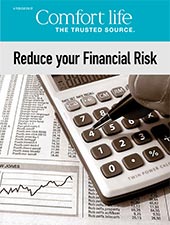How to protect your home from mortgage and real estate title fraud
These types of fraud can take on many different forms; the perpetrators are sophisticated and they use modern technology to their advantage. And, for the most part, these major crimes are committed with the use of the correct documentation and the knowledge about how the real estate process works. First Canadian Title, a title insurance company, estimates that mortgage fraud in Canada has surpassed $100 million in total value. Real estate or title fraud happens about twice a week in Canada, with most victims elderly. But, by taking some simple precautions, you can prevent it from happening to you.

How does real estate title fraud happen?
When you bought your home the ownership was transferred to you and you were given the title to the property in your name. The government land registration documented this and anyone searching the records will see you as the owner.
Real estate fraud occurs when a thief obtains the title to your property through a fraudulent transfer document. Unfortunately it can be very simple and it is almost always tied into an event of identity theft. The fraud artist will target your house, forge the transfer deed and then register the title to the property in their name. Next, they forge a discharge of the existing mortgage and then borrow against the clear title. Of course the fraudster does not make any payments and when the lender serves notice that it intends to foreclose, the scheme is at that point brought to the attention of the real owner.
How much is the average case of title fraud worth?
According to First Canadian Title, the average case of real estate title fraud is around $300,000. Unfortunately it's rare that the criminals who perpetrate these schemes are caught, let alone brought to justice. Other types of mortgage and title fraud can involve spousal impersonation and lawyers who fail to pay off and discharge a mortgage.
What kinds of properties are targeted?
Thieves often target properties that are mortgage free and where the owners have a good credit rating. This allows them to apply for a significant mortgage. There are occasions where mortgage and title fraud are committed by people who are close to the victim, such as paid caregivers. Seniors are particularly vulnerable to this type of fraud.
Why are seniors often targeted?
- they can be more trusting
- they, may be isolated or lonely
- many have more assets than the rest of the population.
- most seniors have spent their lives building credit-worthiness and retirement funds.
- Homes that are mortgage-free are often targeted because the transaction is easier.
Most cases of real estate title and mortgage fraud start with identity theft. This can take many forms. Most often it involves the use of forged or stolen identification. Your driver’s licence, Social Insurance Number (SIN) card, birth certificate, citizenship card, and passport can all be used to apply for credit cards, loans, mortgages, cell phones, and purchases. They can even be used to sell your home without your knowledge. In the event of identity theft, a victim can face financial losses, banking issues and ruined credit history. Generally, the losses from real estate title or mortgage fraud are devastating with homeowners paying thousands of dollars in legal fees to defend their title, and often times do not win. Protecting that information is essential.
20 steps to help prevent identity theft:
The following precautions will protect you against identity theft, as a critical safeguard against title fraud:
- Never rush into anything involving your money or your property.
- Be wary of friends, family members, or caretakers that start asking for small loans or give you stories of hard times, financial hardships, or being victimized by crime. Some criminals will try to play on your emotions to gain access to your identifying information or your financial capabilities.
- Don’t give your personal information to anyone on the phone or over the internet.
- It is advised that you carry only necessary identification. You can put your SIN card, birth certificate or citizenship card in a safety deposit box.
- Keep your personal and identifying information in a safe, locked away from visitors to your home. Bank statements, credit card statements, insurance statements, and other personal documents offer a wealth of identifying information. And since identity theft is often a crime of opportunity, finding such information may present the opportunity that even people you trust can’t resist.
- Keep track of when bills are supposed to arrive in the mail is important so you will notice if a bill is not arriving to the proper address; in this case mail could be redirecting to another address.
- Have your mail delivered to a Post Office box instead of your home address. If it’s not possible for you to pick your mail up from the post office, try to make arrangements with the Post Office to have your mail delivered directly to your door. And always take outgoing mail to the Post Office rather than letting it sit in your curb-side mail box.
- Shred or burn any documents that contain personal information.
- Opt out of direct mail credit offers. Direct mail and credit card contain too much personal information. Identity thieves love to find them in the trash.
- If you use paper cheques, don’t have them delivered to your home. Instead, have them sent to a Post Office box or to your financial institution where you can pick them up.
- Don’t have your home phone number, social insurance number, driver’s license number, or date of birth printed on your cheques. In fact, if you have a Post Office box, use that instead of your home address on your cheques.
- When ordering cheques, use only your first and middle initials with your last name, but sign the bank signature card and cheques with your full name. This will alert the bank to any suspicious activity.
- If you have an ATM debit card, request the bank change it to an ATM only card. These require a pin number and can only be used to withdraw money from the ATM machine, and then only with the correct pin number. If the card is ever compromised, most banks limit on how much money can be withdrawn from an ATM in a day, which could reduce your liability if the card is lost or stolen.
- When paying credit card bills by cheque, write only the last four digits of the account number on the cheque memo line. This prevents your credit card number from falling into the wrong hands.
- Don’t sign the back of your credit and debit cards. Instead put PHOTO I.D. REQUIRED FOR USE in the signature space. Then when a merchant takes the card to verify it, they should request your ID before completing the transaction.
- Keep a list of your credit card numbers and contact numbers for the credit card companies stored in your safe or safety deposit box. If your card is lost or stolen, you need this information to cancel the account.
- Avoid giving out credit card information over the phone if you’re called about a donation. Instead you should call the organization yourself if you wish to donate. This way you ensure a representative from the organization is in fact on the other end of the line.
- Be careful with emails that request you log on to websites. Financial institutions will never send you an email asking you to log into your bank account!
- Beware of free prizes, if it’s too good to be true, it probably is.
- Be skeptical about threatening phone calls. Professional organizations such as banks, the CRA and others follow a professional code of ethics. They will never use aggressive language or threaten you with arrest. They will never ask you to give out personal information over the phone.
Websites about fraud
You and your family should be knowledgeable about con schemes. There are two websites that you should visit regularly to monitor what fraudsters are doing. These are PhoneBusters and the Canadian Anti-Fraud Centre.
PhoneBusters is a third-party consumer watchdog organization, and the Canadian Anti-Fraud Centre is the Government of Canada’s answer to the same problem.
Read our complete guide to seniors and real estate or view our Seniors's real estate agents directory
What to do if you suspect fraud
If you suspect that someone has been tampering with your credit or identity, immediately contact one of the three credit reporting agencies to place a fraud alert on your credit report. They are: Equifax, Experian and Trans Union. You can also subscribe to a membership with the agencies so that you may better monitor your credit for suspicious activity.
Overall, being watchful is one of the best ways to protect against identity theft and other types of fraud. Seniors should be aware that there are products out there that can offer added security for a relatively low cost. These include credit watch products, identity theft protection and real estate title insurance. They are worth every penny.
Sherri Moro, B.A., ABR*, SRES**, is an annually award winning Halton area REALTOR® with Sutton Group Quantum Realty Inc., Brokerage. For over ten years, her very successful consultative approach and innovative strategies have provided preferential client service in both the marketing and purchase of Halton area residential properties. Sherri is also a licensed Mortgage Agent with RBL Capital Inc. #10583 and can assist you with all your borrowing and refinancing needs. Visit her at www.OakvilleDreamHomes.com . *Accredited Buyer Representative, **Specially Designated to Serve the 50+ Market.
Some statistics updated for 2019, by Jim Huinink, editor of ComfortLife.ca.
****
Related articles:
How to protect your parents from scams and fraud
Reverse mortgage, home equity line of credit and home equity loans: Which is right for you?
What seniors should know about selling their homes
What are the real costs of aging at home?
How to buy a retirement condo: Five experts to consult before buying


